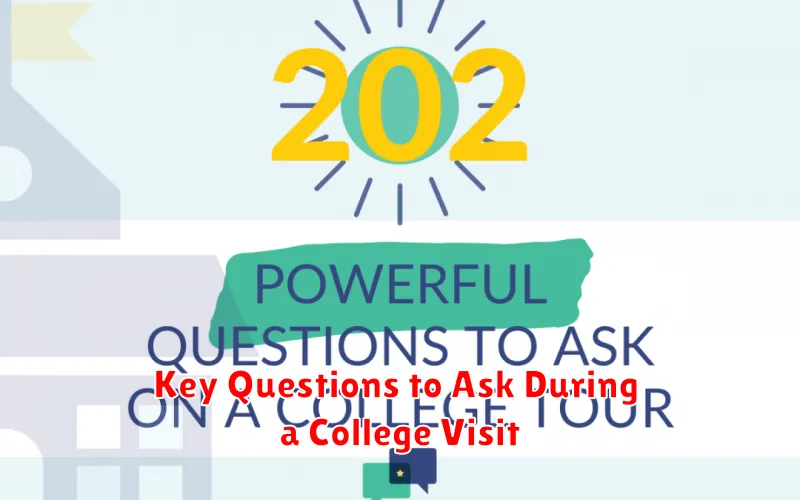Choosing the right college is a pivotal decision. A campus visit is an invaluable opportunity to gain first-hand experience and determine if a college is the right fit for you. Asking key questions during your visit can provide critical insights into academics, student life, and campus resources, helping you make a well-informed decision about your future. This article outlines the most important questions to ask during a college visit, empowering you to navigate this crucial step in your college search process.
From academics and financial aid to campus safety and student support services, understanding the nuances of each institution is essential. By preparing key questions in advance, you can maximize your college visit experience and gather the necessary information to evaluate your options effectively. Don’t miss out on the chance to delve deeper into the college experience – come prepared with these essential questions to ask during a college visit.
What Academic Support Services Are Available?
Academic support services are crucial for student success. Inquiring about these resources during a college visit can give you valuable insights into the institution’s commitment to student learning.
Ask about the availability of tutoring services. Are they free or fee-based? Are tutors available for all subjects? What is the process for accessing tutoring support?
Explore the presence of writing centers. These centers can assist with various stages of the writing process, from brainstorming to final revisions. Find out about the center’s hours of operation and the expertise of its staff.
Inquire about academic advising. How accessible are advisors? What kind of guidance do they offer regarding course selection, major declaration, and academic planning? Do advisors specialize in specific academic areas?
If you have any specific learning needs, ask about disability services and the accommodations they provide. Understanding the support system available can significantly influence your college experience.
What Are the Class Sizes Like?

Class size is a critical factor in the learning experience. Larger lectures can feel impersonal, while smaller classes offer more opportunities for direct interaction with professors and classmates. Asking about average class sizes, especially in your intended major, can help you envision your day-to-day learning environment.
Don’t just ask about the average; inquire about the range. A school might advertise an average class size of 25, but that could mean some introductory courses have 200 students while upper-level seminars have only 10. Understanding this range provides a more realistic picture. Specifically ask about the student-to-faculty ratio as well.
Consider your learning style and preferences. Do you thrive in large group settings or prefer more intimate discussions? Knowing the typical class size will help you determine whether the college is a good fit for your academic needs.
How Accessible Are Professors?
Professor accessibility is a critical aspect of the learning experience. Direct interaction with faculty can significantly impact your understanding of the material and your overall success. Don’t hesitate to inquire about how readily available professors are to students outside of class time.
Consider asking about:
- Office hours: Are they regular and convenient? Do professors offer flexible appointment times?
- Communication methods: How quickly do professors typically respond to emails or other inquiries?
- Teaching assistant (TA) availability: If TAs are utilized, what is their role in supporting student learning and are they accessible?
Observing the campus environment can also offer insights. Are professors’ offices centrally located and easy to find? Does the atmosphere encourage interaction between students and faculty?
What Is Campus Safety Like?

Campus safety is a critical factor in your college decision. Don’t hesitate to ask direct questions about safety protocols and statistics.
Inquire about the availability of campus security, such as the presence of campus police, security escorts, and well-lit walkways. Ask about emergency notification systems and how students are alerted in case of an incident. Understanding the procedures in place can provide valuable peace of mind.
It’s also important to inquire about crime statistics on and around campus. While no campus can guarantee complete safety, transparency about reported incidents can help you assess the overall security environment.
Consider asking about support resources available to students, such as counseling services and victim advocacy programs. A comprehensive approach to safety includes both preventative measures and responsive support systems.
What Housing Options Exist?
Residence halls are typically the most common option for first-year students. They offer a built-in community and convenient access to campus resources.
Apartments, both on- and off-campus, provide more independence and privacy. Consider factors like cost, proximity to campus, and amenities when exploring this option.
Suite-style living combines the community aspect of residence halls with increased privacy. Suites often include shared living spaces and private or semi-private bedrooms.
Special interest housing caters to students with shared interests or backgrounds. Examples include language immersion houses, honors programs housing, and themed living-learning communities.
Family housing may be available for married students or those with children. Availability and eligibility requirements vary by institution.
Be sure to inquire about meal plans and their integration with different housing options. Some residence halls may require meal plans, while others offer more flexibility.

